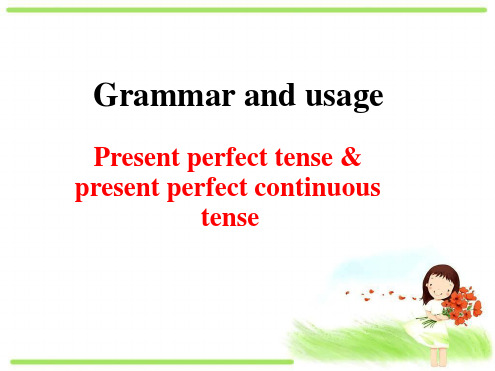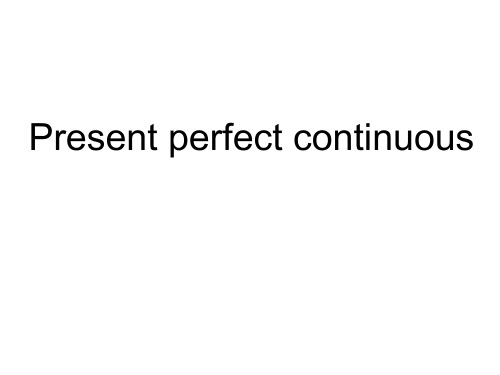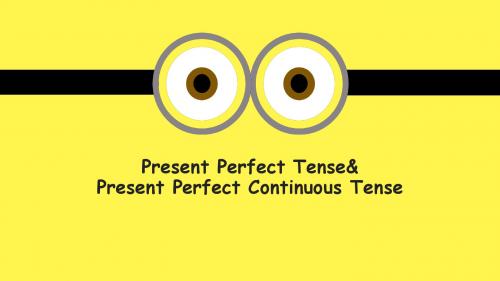高中语法 现在完成时和现在完成进行时PPT
合集下载
现在完成时和现在完成进行时的区别优秀ppt课件

Practice one
Mr. Wolf
---Mr. Wolf, what have you been busy with these days? ---I _h_a_v_e_b_e_e_n__tr_y_i_n_g__ (try) to catch goats, but _h_a_v_e__ never __c_a_u_g_h__t (catch) a single one so far.
1. To talk about things that happened in the recent past but are connected with the present.
分析:过去的动作: got a new pair of glasses 对现在的影响: see more clearly.
总结:表示过去的动作对现在的影响
常跟already, yet 等连用
Watch and think
Usage 2
I have been to Paris twice.
2. To talk about unfinished repeated actions in a lifetime. 总结:表示反复的动作,经验
Grammar and usage
Present perfect tense & present perfect continuous
tense
Present perfect tense
? The monitor has changed his seat, so I can't find him.
I will be back soon!
? It's __b_e_e_n__ a long day without you my friend. And I'll tell you all about it when I see you again.
高考英语语法 现在完成时和现在完成进行时(共27张PPT)

because I__h_a_v_e__d_o_n_e__it_._
already:“I已h经av”e通al常re用ad于y肯re定a句d 中th,is放b在oo句k中. 。 有时,也用在疑问句中表示惊讶。
Have you eaten up all the food already ?
Yet:
“仍然,还 ” 用在疑问句和否定句 中,放在句末。
I haven’t read this book yet . Have you had breakfast yet ?
ever never
“曾经”通常用于疑问句 和肯定句中,放在句中。 I have ever seen this film.
Have you ever been to the USA ?
__f_o_r __two days
__s_in_c_e__1997
__si_n_ce__yesterday
__fo_r___two weeks
afternoon
___s_in_c_e _three years
__si_n_ce__I came here ago
__si_n_ce__last Sunday __s_in_c_e__ last month
强调过去发生的动作对现在产生的结 果或影响
1. My father bought many books for me yesterday .
Now , I have a lot to read because
m__y_f_a_t_h_e_r_h__as__b_o_u_g_h_t_m__a_n_y_b_o_o_k_s__f_or_ me.
3. 现在完成时往往同表示不确定的过去时 间状语连用,如already, yet, just, before, recently, still, lately等标志词
already:“I已h经av”e通al常re用ad于y肯re定a句d 中th,is放b在oo句k中. 。 有时,也用在疑问句中表示惊讶。
Have you eaten up all the food already ?
Yet:
“仍然,还 ” 用在疑问句和否定句 中,放在句末。
I haven’t read this book yet . Have you had breakfast yet ?
ever never
“曾经”通常用于疑问句 和肯定句中,放在句中。 I have ever seen this film.
Have you ever been to the USA ?
__f_o_r __two days
__s_in_c_e__1997
__si_n_ce__yesterday
__fo_r___two weeks
afternoon
___s_in_c_e _three years
__si_n_ce__I came here ago
__si_n_ce__last Sunday __s_in_c_e__ last month
强调过去发生的动作对现在产生的结 果或影响
1. My father bought many books for me yesterday .
Now , I have a lot to read because
m__y_f_a_t_h_e_r_h__as__b_o_u_g_h_t_m__a_n_y_b_o_o_k_s__f_or_ me.
3. 现在完成时往往同表示不确定的过去时 间状语连用,如already, yet, just, before, recently, still, lately等标志词
现在完成时与现在完成进行时的区别ppt课件

He has been there three times the last few days. 近几天他去过那里三次了
4) 用包括“现在”在内的时间状语,如now, today, this morning (month, year, term)等。 -Have you met him today? 今天你见过他吗? -No, I haven't. 我没有。 How many times have you been there this year? 今年你去过那里多少次?
.
7
5) since在现在完成时中经常出现,后面可跟表示 过去的时间状语,例如since yesterday, since two years ago, since 1987等等,since 引导的 从句一般用一般过去式,但主句谓语用现在完成 时。
I have lived here since two years ago. He has lived in Nanjing since the year before last. We have been friends ever since we met at school. 但是当主语表示有多少时间时,主句谓语可用一 般现在时。
• I haven’t seen him today. • I have seen little of her in the past few years. • So far he has done very well at school. • They have known each other since childhood.(现在
• Have you ever been to Hong Kong? • Who has been here? • I have been to Beijing twice. • She has gone to live abroad. • Where has Tim gone?
4) 用包括“现在”在内的时间状语,如now, today, this morning (month, year, term)等。 -Have you met him today? 今天你见过他吗? -No, I haven't. 我没有。 How many times have you been there this year? 今年你去过那里多少次?
.
7
5) since在现在完成时中经常出现,后面可跟表示 过去的时间状语,例如since yesterday, since two years ago, since 1987等等,since 引导的 从句一般用一般过去式,但主句谓语用现在完成 时。
I have lived here since two years ago. He has lived in Nanjing since the year before last. We have been friends ever since we met at school. 但是当主语表示有多少时间时,主句谓语可用一 般现在时。
• I haven’t seen him today. • I have seen little of her in the past few years. • So far he has done very well at school. • They have known each other since childhood.(现在
• Have you ever been to Hong Kong? • Who has been here? • I have been to Beijing twice. • She has gone to live abroad. • Where has Tim gone?
现在完成进行时PPT课件

2021
6
三、 用法: 1) 现在完成进行时可以表示一个从过去某时
开始一直在进行并持续到现在的动作。这个 动作刚刚结束,对现在有影响。
• I'm tired because I've been running. 我很累因为我一直跑到现在。 (强调动作一直进行并持续到现在) 对比:I'm tired because I've run. 我累了因为我跑了。(强调动作已完成)
• Where has he been20t2h1 ese days?
25
2021
17
• 3.现在完成时可以用持续性动词和短暂性动
词作谓语,而现在完成进行时则只能用持
续性动词。
√
I have done my homework.
I have finished my homework. √
I have been doing my homework. √
I have been finishing my homework x
• 2.我父亲以前到过长城。
• My father has been to the Great Wall before.
• 3、她还没有看过那部新电影。
• She hasn't seen the new film yet.
• 4、她去过上海。
• She has been to Shanghai.
• 5、他这些天上哪儿去了?
2021
18
• 4.现在完成时的句子中可以用像never、yet、 already和ever等作时间状语,而现在完成 进行时的句子中则不可以用这样的词
• I have already been to Beijing.
现在完成进行时和现在完成时(共28张PPT)

• Structure • Meaning • Usages
1.自从回家以来我一直睡不好觉。 I _h_a_v_e_n_’_t_b_e_e_n_s_l_e_e_p_in_g__ well since I returned home.
2.这本书他已读了两个小时了,但还没读完。 He _h_a_s_b__ee_n__r_e_a_d_in_g__ this book for two hours, but he hasn’t finished it.
比较三:
Tip 3:现在完成进行时比较生动,有时含有 明显的感情色彩,而现在完成时往往只说明 一个事实,一种影响或结果。
试比较:
I have been dreaming to be an astronaut.
I have dreamt to be an astronaut.
比较四:(state verb & action verb)
camera.
√
Tip 4:现在完成时可以用表状态的动词(have)和表动作 的动词(take)作谓语。而现在完成进行时只能用表动作 的动词(take)作谓语。
State verb & action verb
常用表状态、情感、感觉的动词: (1)have, exist,know,belong to等 (2)like, love,hate, believe, want, regret,
I have had this camera for five years. √
I have taken photos of UFOs with this camera.
√ I have been having this camera for five year×s.
1.自从回家以来我一直睡不好觉。 I _h_a_v_e_n_’_t_b_e_e_n_s_l_e_e_p_in_g__ well since I returned home.
2.这本书他已读了两个小时了,但还没读完。 He _h_a_s_b__ee_n__r_e_a_d_in_g__ this book for two hours, but he hasn’t finished it.
比较三:
Tip 3:现在完成进行时比较生动,有时含有 明显的感情色彩,而现在完成时往往只说明 一个事实,一种影响或结果。
试比较:
I have been dreaming to be an astronaut.
I have dreamt to be an astronaut.
比较四:(state verb & action verb)
camera.
√
Tip 4:现在完成时可以用表状态的动词(have)和表动作 的动词(take)作谓语。而现在完成进行时只能用表动作 的动词(take)作谓语。
State verb & action verb
常用表状态、情感、感觉的动词: (1)have, exist,know,belong to等 (2)like, love,hate, believe, want, regret,
I have had this camera for five years. √
I have taken photos of UFOs with this camera.
√ I have been having this camera for five year×s.
2024版现在完成时与现在完成进行时完整版课件

题目2
I _______ (write) this letter since breakfast.
06
解析
现在完成进行时强调动作的持续性,表示“自 从早饭过后我一直在写这封信”。
改错题
01
题目1
I have finished to read the book.
02
答案
I have finished reading the book.
语境创设
通过创设不同的语境,体 会两种时态的使用场景和 表达效果,提高语言运用 的准确性。
练习巩固
通过大量的练习,熟练掌 握两种时态的构成和用法, 提高语言运用的熟练度。
相关资源推荐
教材教辅
01
推荐《英语语法大全》、《英语语法手册》等教材教辅,系统
学习英语语法知识。
在线课程
02
推荐Coursera、edX等在线课程平台上的英语语法课程,灵活
否定形式
主语 + have/has + not + 动词的过 去分词 + 其他成分
动词变化规则
规则动词变化
直接在动词后加-ed,如“play” 变为“played”。
不规则动词变化
需要单独记忆,如“go”变为 “gone”,“eat”变为“eaten” 等。
特殊动词变化
部分动词在过去分词形式上有特殊 变化,如“write”变为 “written”,“ride”变为 “ridden”等。
PART 05
练习题与答案解析
选择题
• 题目1:I ___my homework for two hours.
选择题
A. have finished
B. have been finishing
高中英语详解现在完成时及现在完成进行时课件

T: What have you been doing to realize your dream? S: I have been studying hard at my subjects ,especially my English.
conclusion 2
We uset_he__p_re_s_e_nt_p_e_r_fe_c_t t_e_n_se____, not_t_h_e_p_re_s_e_n_t p_e_r_fe_c_t _co_n_t_in_u_o_u_s_te_n_s_e_ , with words like never, yet, already and ever etc.
present perfect tense present perfect continuous tense
The main task
To describe what the Chinese people have done or have been doing for the 2008 Olympic Games by using the present perfect tense or the present perfect continuous tense.
2. We use __th_e_p_r_e_s_e_n_t _p_e_rf_e_ct_c_o_n_t_in_u_o_u_s_t_e_n_s_e___ for an action that started in the past and is still continuing.
Sentence making
Digital Beijing Building
(北京数字大厦)
National Stadium
(国家体育馆)
conclusion 2
We uset_he__p_re_s_e_nt_p_e_r_fe_c_t t_e_n_se____, not_t_h_e_p_re_s_e_n_t p_e_r_fe_c_t _co_n_t_in_u_o_u_s_te_n_s_e_ , with words like never, yet, already and ever etc.
present perfect tense present perfect continuous tense
The main task
To describe what the Chinese people have done or have been doing for the 2008 Olympic Games by using the present perfect tense or the present perfect continuous tense.
2. We use __th_e_p_r_e_s_e_n_t _p_e_rf_e_ct_c_o_n_t_in_u_o_u_s_t_e_n_s_e___ for an action that started in the past and is still continuing.
Sentence making
Digital Beijing Building
(北京数字大厦)
National Stadium
(国家体育馆)
高中英语详解现在完成时及现在完成进行时课件

conclusion3
We usually use the present perfect tense to ask questions beginning with_____________, how many/much and the present perfect continuous tense to ask questions beginning how long with_________.
Task 4
Hua Tian
He_______ has had(have) his horse for five years. have, believe ,know, like, hate … has been preparing(prepare) for the He ________________ coming Olympic Games for 3 years . Action verb prepare, read ,write, watch …
conclusion 2
present perfect tense We use the ____________________, not___________________________, the present perfect continuous tense with words like never, yet, already and ever etc.
Task 1
Swimming Centre Bird’s Nest
We have built the Swimming Centre.
We have been building the Bird’s Nest.
Racecourse built (build) The eco-environment ________________ has been improving the Racecourse in Beijing for the Olympic (improve) in Beijing in Games. recent years.
现在完成时和现在完成进行时的区别ppt课件

【易混辨析】
用所给ห้องสมุดไป่ตู้的正确形式填空。
①Now that he is out of work,John _h_a_s_b_e_e_n_c_o_n_s_i_d_e_r_in_g_(consider) going back to school,but he _h_a_s_n_’t__d_e_ci_d_e_d_(decide) yet.
②We h__a_v_e_b_e_e_n_w__o_r_k_in__g_(work) the whole week, but we just _h_a_v_e_f_i_n_is_h_e_d_(finish) half of the project.
③I h_a_v_e__b_e_en__w_a_i_t_in_g__(wait) for him for 2 hours, but he _h_a_s_n_’t__c_o_m_e_(not come) so far.
【自我归纳】 现在完成进行时是一种兼有_现__在__完__成__时__和_现__在__进__行__时__二
者基本特点的时态。 所以它既有_现__在__完__成__时__的特点,又有现在进行时的特点,
即:它也可以表示某一动作的延续性、重复性、生动性乃至感 情色彩,而现在完成时却不能。
试比较下面几组句子: Someone has phoned you. (打了电话) Someone has been phoning you. (一直在打电话) I’ve read the novel. (已读完) I’ve been reading the novel. (还没读完) Have you met her lately? (强调动作的结果,见到她了吗?) Have you been meeting her lately? (强调动作的重复, 经常见面) Who’s eaten my apples? ( 苹果没有了) Who’s been eating my apples? (有感情色彩, 表示愤怒不满)
现在完成时与现在完成进行时的语法PPT

1. Li Ming has just turned off the light.
(说明现在灯关上了)
2. I’ve finished my homework now/already. (说明可以交作业了) 3. I have lost my pen. (说明过去某时丢的,现在我还没找到这支笔) 4. She has become a teacher. (说明她现在仍是老师)
1. I have taught in this school for 12 years. (现在还在这个学校教书) 2.I have travelled to most of the cities in China since five years ago. (现在还在继续旅游) 3.They've known each other since childhood.
Present Perfect Continuous Tense
现在完成进行时
Form:
have/has + been + doing
Analysis:
have been writing letters for an hour . I___________________
Connection with the past: I wrote letters an hour ago. I’ve still got some more to do.
Connection with the present:
意义:过去某时开始一直延续至今的动作,可能还要继续进行表示动作从 过去某一时刻开始,一直延续到现在,现在这个动作可能刚刚结束,也可能 继续进行下去。(和现在完成时的“未完成”用法相仿)
高三英语一轮复习现在完成时和现在完成进行时课件 (共44张PPT)

Note 1: to talk about things that
happened in the recent past, but are connected to the present. Justin has disappeared, so Kelly is very sad.
I can’t enter my house because I have lost
Now it is not still in the morning.
Note The present perfect tense used for a past action whose time is not definite and often has a result in the present.
my key.
Note 2: to talk about something that
started in the past and is still happening now. I have not seen Justin since last Friday night.
Note 3: We use the present perfect tense when the exact time of an action is not clear or important. I haven’t seen you for ages. He has just gone out. It has been very cold lately. She has already finished her homework. He hasn’t seen her since the meeting.
Note 6: We can also use the present perfect tense for repeated actions, that is, we use the present perfect tense with the time expressions once/twice/three times… They say that they have been to America many times.
happened in the recent past, but are connected to the present. Justin has disappeared, so Kelly is very sad.
I can’t enter my house because I have lost
Now it is not still in the morning.
Note The present perfect tense used for a past action whose time is not definite and often has a result in the present.
my key.
Note 2: to talk about something that
started in the past and is still happening now. I have not seen Justin since last Friday night.
Note 3: We use the present perfect tense when the exact time of an action is not clear or important. I haven’t seen you for ages. He has just gone out. It has been very cold lately. She has already finished her homework. He hasn’t seen her since the meeting.
Note 6: We can also use the present perfect tense for repeated actions, that is, we use the present perfect tense with the time expressions once/twice/three times… They say that they have been to America many times.
- 1、下载文档前请自行甄别文档内容的完整性,平台不提供额外的编辑、内容补充、找答案等附加服务。
- 2、"仅部分预览"的文档,不可在线预览部分如存在完整性等问题,可反馈申请退款(可完整预览的文档不适用该条件!)。
- 3、如文档侵犯您的权益,请联系客服反馈,我们会尽快为您处理(人工客服工作时间:9:00-18:30)。
3.You are eating in a restaurant this
evening. The waiter thinks you have finished and starts to take your plate away.You say: Wait a I haven’t finished it yet. moment !_______________________ ( not / finish )
ever
never
“曾经”通常用于疑问句 和肯定句中,放在句中。 I have ever seen this film. Have you ever been to the USA ?
“从来不” 用在否定句中,放在句 中。 Is he famous ?I have never heard of him .
Unit1 Grammar
Present perfect tense & present continuous tense
past
Yesterday , we cleaned the classroom.
now
Now , the classroom is clean because we have cleaned it.
用法1
强调过去发生的动作对现在产生的结 果或影响
1. My father bought many books for me yesterday . Now , I have a lot to read because my father has bought many books for me. ________________________________ 2. I saw this film last week. Now, I know this film because have seen it before I_____________________. 3. I did my homework yesterday. Now, I can give it to the teacher because I______________ have done it.
这些瞬间动词常与它对应的可以表示时间段的词语进行互换。 become—be borrow—keep buy—have begin (start)—be on open—be open die—be dead leave--be away come--be here/in go out—be out join--be a member/be in begin to study--study
just
“刚刚 ”用在陈述句中, 放在句中。 I have just bought a novel。
“以前”用在完成时中,
before
放在句末。 Ihave never read this kind of books before.
She began to work in 2005.
She still works here now. She has worked at this school for 9 years.
have (has) gone和have (has) been的区别
1.have (has) gone表示“已经去某地了” She has gone to Shanghai .(她可能已在去上海 的路上,或已到上海,总之现在不在这里。)
2.have (has) been表示“曾经去过某地” She has been to Shanghai three times.(她已经不 在上海,只说明她曾经去过。)
非延续性动词不能与时间段连用: go/come/begin/start/die/buy/borrow/sell/leave/arrive/ receive/become等词语是瞬间动词表示的动作是一时的, 不能延续,不能与for、since等表示一段时间的词连用, 也不能用于how long引导的疑问句中。 如不能说:He has borrowed the book for two months.(ⅹ) 但可以说:He has kept the book for 2 months. 或:It has been 2 months since he borrowed the book. 或:Two months has passed since he borrowed the book.
since and for
The woman has worked at this school for 2 years.( since two years ago) for + 时间段 for 2 years/a long time
since 2 years ago since+时间点 since 1998 since she came to the school)
3. 现在完成时往往同表示不确定的过去时 间状语连用,如already, yet, just, before, recently, still, lately等标志词
He has already got a chance to go abroad. I haven't seen much of him recently (lately). We have seen that film before. Have they found the missing child yet ?
一、用for和since填空。
for ______three
hours
_______a week for since _______1997 for ______two weeks
since for ______three o’clock _______a long time
for ______two days since ______yesterday afternoon
2.表示过去开始的动作刚结束并在某种情况 下与现在有关联 —— Sorry, I’m late, have you been waiting long? —— Yes, I have been waiting for an hour.
C 1.The price _____recently, but I doubt whether it will remain so. A went down, B will go down C has gone down D was going down 2. In the past few years there ____ great C changes in Da Miao town. A is B were C have been D will be.
2. 现在完成时可以用来表示发生在过 去某一时刻一直持续到现在的动作和 状态,常与表示持续的时间状语连用. 表示持续动作或状态的动词多是延续 性动词。
I haven’t seen her these days. Mary has been ill for three days. I have lived here since 1998.
4. 现在完成时常常与表示频度的时间状语 连用,如often, sometimes, ever, never, twice, on several occasion等: Have you ever been to Beijing? I have never heard of Bunny. I have used this pen only three times. George has met that gentleman on several occasions.
4.You are going to a restaurant this evening.
You phone to reserve(预定)a table. Later your friend says ‘Shall I phone to reserve a table? ’You say: I have already done No,__________________ it (do)
“已经”通常用于肯定句中,放在句中。 already: I have already read this book. 有时,也用在疑问句中表示惊讶。 Have you eaten up all the food already ?
Yet:
“仍然,还 ” 用在疑问句和否定句 中,放在句末。 I haven’t read this book yet . Have you had breakfast yet ?
since _______three years since ______I came here ago since ______last Sunday since _______ last month
Exercise
根据所给情况,用just,already或yet造句。 1.After lunch you go to see a friend at her house.She says‘Would you like something to eat?’ You say: No, thank I’ve just had lunch. you. _______________( have lunch ) 2.Joe goes out. Five minutes later,the phone rings and the caller says ‘Can I speak to Joe?’ You say: I’m afraid he has just gone out _________________.( go out )
past
I began to teach English at this school five years ago.
